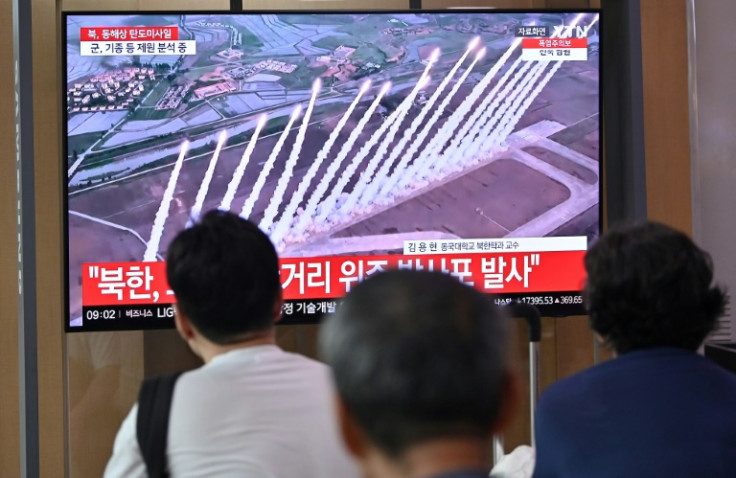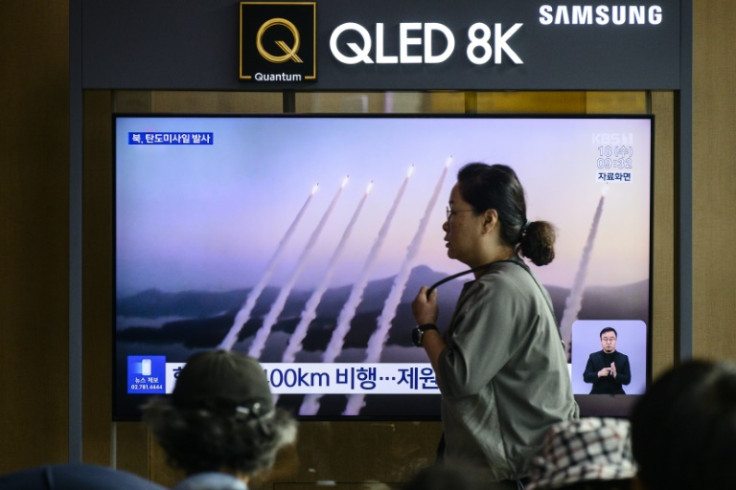North Korea Fires Multiple Short-range Ballistic Missiles

North Korea fired a salvo of short-range ballistic missiles early Wednesday, Seoul's military said, Pyongyang's second such weapons test in a week.
Leader Kim Jong Un's regime has staged dozens of launches this year, part of a testing spree that experts say could be linked to North Korea's alleged illicit supplying of weapons to ally Russia for use in Ukraine.
Pyongyang has denied any sanctions-busting weapons trade with Russia, but with diplomacy long stalled, it declared South Korea its "principal enemy" this year and recently moved nuclear-capable weapons to border areas.
The launch follows North Korea's recent dispatch of its foreign minister to Moscow -- a key supporter of Kim's regime -- for her second visit in less than a year.
The North is also preparing for a parliamentary meeting in October that is expected to approve measures likely to escalate tensions with South Korea, including incorporating the hostile relationship between the two Koreas into its constitution.
Seoul's Joint Chiefs of Staff (JCS) said it had "detected and (was) analysing several short-range ballistic missiles launched to the northeast around 06:50 (2150 GMT)".
"In preparation for additional launches, our military has strengthened monitoring and vigilance, while closely sharing information," with allies Tokyo and Washington, it added.
Tokyo also confirmed the launch, with the country's coastguard saying one missile had splashed down already.
"Vessels please pay attention to information coming ahead and if you spot fallen objects please don't approach closer but report it to the coastguard," it said in a statement.
Japan's Defence Minister Minoru Kihara later said the missiles "appear to have landed on around the eastern coast of North Korea's inland area," and therefore "are outside Japan's EEZ", adding no damage was reported.
Seoul's military said the missiles were fired from the North's Kaechon area in South Phyongan Province, and flew about 400 kilometres (250 miles).
"North Korea's missile launch is a clear act of provocation that seriously threatens peace and stability on the Korean Peninsula, and we strongly condemn it," Seoul's JCS said in a statement.
Last Thursday, the North fired what Seoul described as multiple short range ballistic missiles into waters east of the Korean peninsula, the nuclear-armed country's first major weapons test since early July.
North Korean state media later claimed that this had been a test of a "new-type 600mm multiple rocket launcher" which was overseen by Kim.
North Korea has recently bolstered military ties with Moscow, with President Vladimir Putin making a rare visit to Pyongyang in June, where he signed a mutual defence agreement with Kim.
Experts have long said North Korean missiles are being deployed in Ukraine.
"Considering the resurgence of the war in Ukraine and Shoigu's recent visit to North Korea, the latest missile launches could be for exports to Russia," Yang Moo-jin, president of the University of North Korean Studies in Seoul, told AFP.
"Today's missile launch may also be intended to strengthen anti-South sentiment among North Koreans as part of efforts to solidify the regime ahead of what is understood as the 'constitutional formalisation' of the hostile two-nation theory of the Koreas in October," he added.
A report released last week by Conflict Armament Research employed debris analysis to show "that missiles produced this year in North Korea are being used" on the battlefield against Kyiv.
Russian security chief Sergei Shoigu visited Pyongyang last weekend, state media reported, and met Kim for talks.
Moscow is seeking ammunition to continue its more than 30-month offensive in Ukraine.
Since May, North Korea has sent more than 5,000 trash-carrying balloons southward, saying they are retaliation for propaganda balloons launched by South Korean activists.
Last week, the North released images of its uranium enrichment facility for the first time, showing Kim touring it as he called for more centrifuges to boost his nuclear arsenal.
The country, which conducted its first nuclear test in 2006 and is under rafts of UN sanctions for its banned weapons programmes, has never publicly disclosed details of its uranium enrichment facility.
"In light of the recent disclosures regarding its uranium enrichment facilities, (the latest missile launches) may be paving the way for North Korea's seventh nuclear test", said Yang, of the University of North Korean Studies in Seoul.
North Korea's nuclear weapons programmes are banned by UN sanctions, but the country has long flouted the restrictions, thanks in part to support from allies Russia and China.

© Copyright AFP 2025. All rights reserved.





















